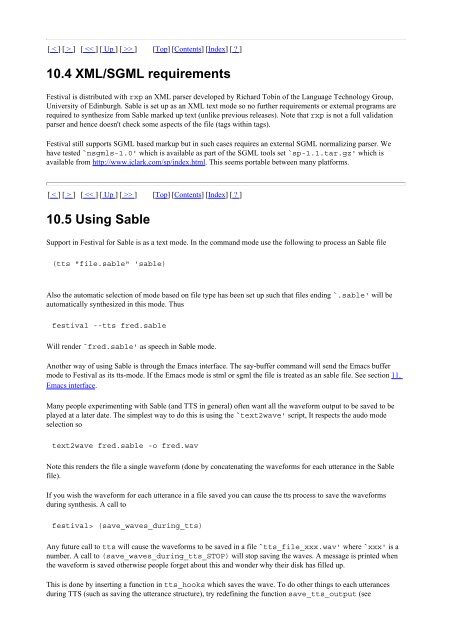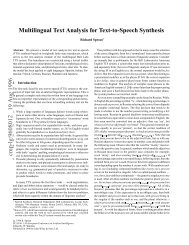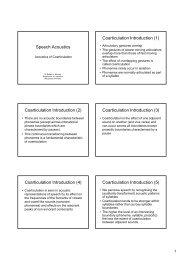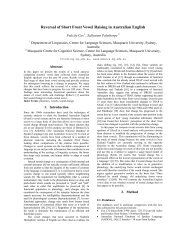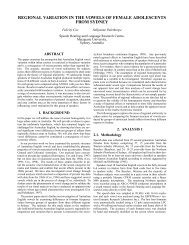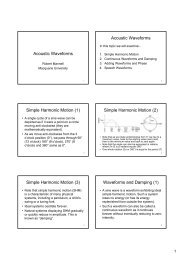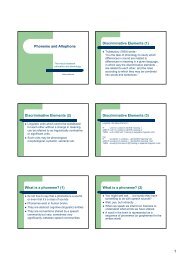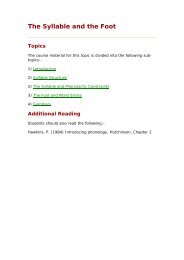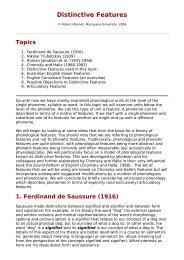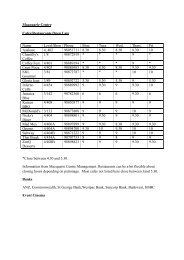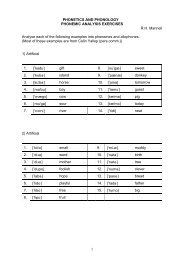Festival Speech Synthesis System: - Speech Resource Pages
Festival Speech Synthesis System: - Speech Resource Pages
Festival Speech Synthesis System: - Speech Resource Pages
You also want an ePaper? Increase the reach of your titles
YUMPU automatically turns print PDFs into web optimized ePapers that Google loves.
[ < ] [ > ] [ > ] [Top] [Contents] [Index] [ ? ]<br />
10.4 XML/SGML requirements<br />
<strong>Festival</strong> is distributed with rxp an XML parser developed by Richard Tobin of the Language Technology Group,<br />
University of Edinburgh. Sable is set up as an XML text mode so no further requirements or external programs are<br />
required to synthesize from Sable marked up text (unlike previous releases). Note that rxp is not a full validation<br />
parser and hence doesn't check some aspects of the file (tags within tags).<br />
<strong>Festival</strong> still supports SGML based markup but in such cases requires an external SGML normalizing parser. We<br />
have tested `nsgmls-1.0' which is available as part of the SGML tools set `sp-1.1.tar.gz' which is<br />
available from http://www.jclark.com/sp/index.html. This seems portable between many platforms.<br />
[ < ] [ > ] [ > ] [Top] [Contents] [Index] [ ? ]<br />
10.5 Using Sable<br />
Support in <strong>Festival</strong> for Sable is as a text mode. In the command mode use the following to process an Sable file<br />
(tts "file.sable" 'sable)<br />
Also the automatic selection of mode based on file type has been set up such that files ending `.sable' will be<br />
automatically synthesized in this mode. Thus<br />
festival --tts fred.sable<br />
Will render `fred.sable' as speech in Sable mode.<br />
Another way of using Sable is through the Emacs interface. The say-buffer command will send the Emacs buffer<br />
mode to <strong>Festival</strong> as its tts-mode. If the Emacs mode is stml or sgml the file is treated as an sable file. See section 11.<br />
Emacs interface.<br />
Many people experimenting with Sable (and TTS in general) often want all the waveform output to be saved to be<br />
played at a later date. The simplest way to do this is using the `text2wave' script, It respects the audo mode<br />
selection so<br />
text2wave fred.sable -o fred.wav<br />
Note this renders the file a single waveform (done by concatenating the waveforms for each utterance in the Sable<br />
file).<br />
If you wish the waveform for each utterance in a file saved you can cause the tts process to save the waveforms<br />
during synthesis. A call to<br />
festival> (save_waves_during_tts)<br />
Any future call to tts will cause the waveforms to be saved in a file `tts_file_xxx.wav' where `xxx' is a<br />
number. A call to (save_waves_during_tts_STOP) will stop saving the waves. A message is printed when<br />
the waveform is saved otherwise people forget about this and wonder why their disk has filled up.<br />
This is done by inserting a function in tts_hooks which saves the wave. To do other things to each utterances<br />
during TTS (such as saving the utterance structure), try redefining the function save_tts_output (see


